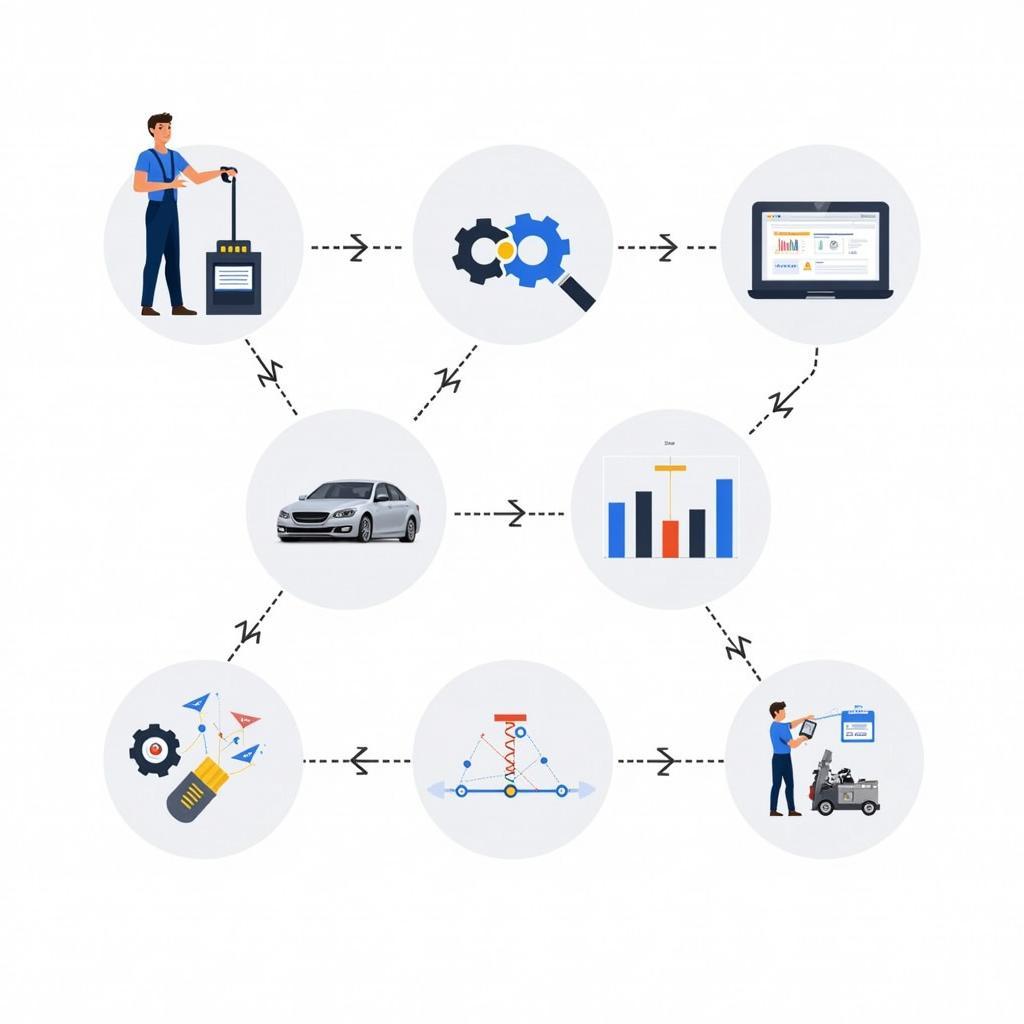Car Engine Diagnostics have revolutionized the way we maintain and repair vehicles. No longer are mechanics left to guesswork and intuition when faced with an engine issue. Today, sophisticated car engine diagnostics tools provide a window into the heart of your vehicle, allowing for accurate identification of problems and efficient repairs.
What are Car Engine Diagnostics?
Car engine diagnostics involve retrieving data from your vehicle’s onboard computer, the Engine Control Unit (ECU). This data, generated by various sensors throughout the engine and other systems, provides a snapshot of your vehicle’s health and performance. By analyzing this information, mechanics can pinpoint the root cause of engine problems, from minor glitches to major malfunctions.
 Car Engine Diagnostics Process
Car Engine Diagnostics Process
The Importance of Regular Car Engine Diagnostics
Regular car engine diagnostics are no longer an optional extra but a crucial aspect of car maintenance. Early detection of potential problems can save you time, money, and even prevent dangerous breakdowns on the road. Here’s why you should prioritize regular diagnostics:
- Prevent Costly Repairs: Detecting issues early often means simpler, less expensive fixes. A small problem left unchecked can snowball into a major (and expensive) repair down the line.
- Improve Fuel Efficiency: A well-tuned engine runs more efficiently, maximizing your fuel economy and saving you money at the pump.
- Increase Vehicle Lifespan: Regular diagnostics and timely maintenance contribute to the longevity of your vehicle.
- Ensure Safety on the Road: Identifying and addressing issues promptly enhances the safety and reliability of your vehicle, giving you peace of mind behind the wheel.
Common Symptoms Indicating You Need Car Engine Diagnostics
While regular checks are ideal, certain symptoms may indicate an urgent need for car engine diagnostics. These include:
- Check Engine Light: This is your car’s way of telling you something is wrong. Don’t ignore it.
- Unusual Noises: Knocking, tapping, or hissing sounds coming from your engine should never be disregarded.
- Decreased Performance: A noticeable decrease in your car’s power, acceleration, or fuel efficiency warrants immediate attention.
- Rough Idling or Stalling: If your engine shakes excessively while idling or stalls frequently, it’s time for a diagnostic check.
- Increased Emissions: Excessive smoke or a foul smell from your exhaust indicates a problem that needs immediate attention.
 Car Diagnostic Tool Connected(https://diagfixpro.com/foxwell-nt414-car-diagnostic-scan-tool/) to a car’s OBD-II port, signifying the process of retrieving diagnostic data for engine analysis.]
Car Diagnostic Tool Connected(https://diagfixpro.com/foxwell-nt414-car-diagnostic-scan-tool/) to a car’s OBD-II port, signifying the process of retrieving diagnostic data for engine analysis.]
What Do Car Engine Diagnostics Tools Reveal?
Modern car engine diagnostics tools offer a wealth of information about your vehicle’s engine performance. They can read and interpret various data points, including:
- Error Codes: These codes, stored in the ECU, pinpoint specific areas of concern within the engine system.
- Sensor Data: The tool can access real-time data from various engine sensors, such as oxygen sensors, mass airflow sensors, and throttle position sensors, providing insights into engine performance.
- Engine Parameters: Engine speed, temperature, fuel pressure, and other crucial parameters can be monitored and analyzed.
- Historical Data: The tool can access past performance data, allowing mechanics to identify patterns and potential recurring issues.
DIY vs. Professional Car Engine Diagnostics: Which Route to Take?
While basic OBD-II code readers are readily available for DIY enthusiasts, opting for professional car engine diagnostics is often recommended. Professional-grade tools offer a more comprehensive analysis, accessing a wider range of data and providing more detailed insights. Furthermore, experienced mechanics possess the knowledge and expertise to interpret the diagnostic data accurately and recommend the most effective course of action.
Conclusion
Car engine diagnostics are indispensable for maintaining a healthy and efficient vehicle. By understanding their importance, recognizing warning signs, and utilizing the power of these diagnostic tools, car owners can enjoy optimal engine performance, improved fuel economy, and safe travels for years to come.

Leave a Reply